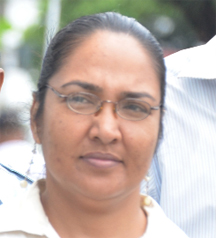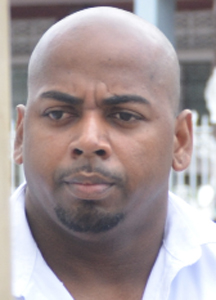Superintendent of Police Hugh Jessemy yesterday agreed with suggestions made by the defence in the Neesa Gopaul murder trial that when Bibi Sharima-Gopaul and Jarvis Small were charged, the police had no evidence against them.
Jessemy was at the time testifying in the case for which Sharima-Gopaul; Neesa’s mother, and Jarvis Small, are on trial for the teen’s murder before Justice Navindra Singh and a 12-member jury. They are accused of killing the 16-year-old between September 24, 2010, and October 2, 2010, at Madewini, Linden-Soesdyke Highway. The teen’s body had been stuffed into a suitcase, which was anchored in a creek at the Emerald Tower Resort with several dumbbells.
Under cross-examination by attorney Lyndon Amsterdam; one of Small’s four attorneys, Jessemy agreed that when he joined the investigation on October 6, 2010; he did not enquire from other investigators, what evidence they had; if at all they had any evidence, linking Small to the crime.
He admitted too that up to the point when the accused were arraigned on October 8, 2010, the police had no evidence against them.

Quizzed about having to apply for an extension of time to keep the accused in custody, the Superintendent also accepted that up to that point, as far as he knew, the police had no evidence to institute a charge of murder against the accused.
The Superintendent agreed too, that Small’s alleged utterance to the police ‘of not killing Neesa, but of knowing who did,’ was a “seeming bit of evidence” the police had against his client.
In the same vein however, Jessemy also admitted that as an investigator he has had experience where persons claim to know things which are subsequently discovered to have no merit. Or that, that person may have merely been repeating what someone else had told them.
Jessemy also agreed with Amsterdam that there was a “clear and unequivocal” statement in the utterance police have attributed to Small, where he said, “I did not kill Neesa Gopaul.”
Several police witnesses had testified that Small had told them during an interview that he did not murder the teen but knew who did and that if he were to reveal that information, the investigation would turn in the “correct direction.”
Asked whether he enquired from Small if he was present when Neesa was killed, the Superintendent answered in the negative.
His answer was also the same when asked whether he had received any information of evidence which may have suggested that Small participated whether alone, or with anyone else in the death of Neesa.
He also said that he received no information that Small knew when or where the teen was killed.

Jessemy agreed with counsel that these questions needed to be answered by either Small or someone else in a bid to clear-up the circumstances which would suggest that Small was responsible for Neesa’s death.
The witness agreed with a suggestion from the attorney that when dealing with circumstantial evidence, investigators must try to eliminate all other possibilities, so that at the end of such an exercise, police would be left with evidence pointing only to the person(s) they wish to charge.
The witness agreed with Amsterdam that knowing where, when and who had died; are all elements the police needed to have known before instituting a charge of murder against the accused.
Jessemy however said that while the police did not know where and when the person had died; they were sure of who had died.
In a follow-up question, counsel then asked the Superintendent why the police embarked on DNA testing to identify the corpse, if they were sure that it was the 16-year-old who had died.
Jessemy said while he knew that DNA testing was being done, the police were nonetheless sure that it was Neesa who had died.
On Tuesday, Jessemy read an ordinary statement to the court which he said he took from Sharima-Gopaul, who he said had told him a number of things; including that her daughter “slept out at times.”
Asked by Amsterdam yesterday if the police tried to enquire where the teen would leave and go, the witness answered in the negative.
His answer was the same when asked whether, apart from the accused, police questioned other persons who knew the teen, as to when they may have last seen her.

He said also that he did not know if anyone was questioned who might have known that Neesa had gone to the Emerald Tower Resort.
The Superintendent agreed with counsel that such enquiries would have been useful to the investigation.
He also agreed that checking phone and computer records belonging to a missing person could provide valuable clues regarding the whereabouts of the person, but admitted that no such checks were done in this case.
Meanwhile, responding to questions under cross-examination by George Thomas; Sharima-Gopaul’s attorney, Jessemy said he did nothing to investigate the content of the ordinary statement which he said he took from the woman.
He also told counsel when asked, that he took no steps to review footage from the CCTV cameras mounted at the Demerara Harbour Bridge; since he knew that Neesa lived on the West Coast Demerara.
Asked if from the time he had taken the ordinary statement, to the time Sharima-Gopaul was charged, whether he had gotten any information which implicated her in her daughter’s death, Jessemy said no.
To end his cross-examination, Thomas suggested to the superintendent that the police charged his client without conducting a thorough investigation. The witness responded, “I don’t know.”
The trial continues this morning at 9.
Small is represented by a team of four lawyers: Amsterdam, Glenn Hanoman, Bernard De Santos SC, and Zanna Frank.





